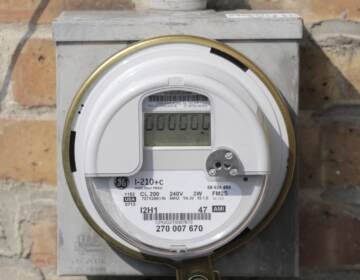New Jersey is gearing up to dispatch a new round of ANCHOR property tax relief money to homeowners and renters
Some people who qualified for an ANCHOR payment last year will have to fill out a new application. Here’s what you need to know to get your money.
Listen 1:07
Gov. Phil Murphy discusses the Anchor property-tax relief program. (Credit/NJ Governor’s Office)
From Camden and Cherry Hill to Trenton and the Jersey Shore, what about life in New Jersey do you want WHYY News to cover? Let us know.
New Jersey homeowners and renters will soon be receiving Affordable New Jersey Communities for Homeowners and Renters, aka ANCHOR, property tax relief payments in their mailboxes and bank accounts.
Last year, the Garden State issued more than 2 million rebates totaling approximately $2.3 billion, and state officials expect a similar payout this year.
New Jersey Department of the Treasury officials confirmed that they began mailing out nearly 1 million auto-file letters to residents last week. The letter informs residents that they received an ANCHOR payment last year, and that their new ANCHOR applications have been automatically filed.
Marita R. Sciarrotta, director of the New Jersey Division of Taxation, is advising residents to make sure the information in the letter is accurate.
“If anything has changed, if they moved or got married or have been widowed, or perhaps they’ve changed their bank account, in that case they need to update the information,” she said. “If everything is accurate in the letter, no one has to do anything, they can simply wait for their payment.”
A major application change
Sciarrotta said that because of a change in the law this year, anyone who is 65 years old or older, or is collecting social security disability payments, must fill out a new application form called PAS-1 that combines ANCHOR, the Senior Freeze and the soon-to-be-implemented Stay NJ programs. She said the form must be completed even if someone is only applying for ANCHOR benefits.
“Please file the PAS-1, even though that form is a combination form for three programs, it is essential that those folks who are tenants who are over 65 to file the PAS-1,” Sciarrotta said.
New Jersey’s Senior Freeze program freezes property tax rates for older adults and those with disabilities. The Stay NJ program, scheduled to take effect in 2026, is designed to cut property taxes for those 65 and older, based on a formula that will factor in their current property tax rate and their income.
The deadline to complete the PAS-1 form is Oct. 31.
How much will you get?
The amount of ANCHOR property tax relief offered to homeowners and renters has remained constant since the program began four years ago.
Sciarrotta said homeowners with incomes of $250,000 or less are eligible for an ANCHOR benefit of $1,000, plus $250 if they are 65 or older. Homeowners making $150,000 or less will receive $1,500, but will get an additional $250 if they’re at least 65.
“All tenants are entitled to, or eligible for $450, if they are over the age of 65 they are entitled to another $250,” she said.
The type of ANCHOR benefit is determined by where a resident lived on Oct. 1, 2024.
James Hughes, dean emeritus of the Edward J. Bloustein School of Planning and Public Policy at Rutgers University, said the ANCHOR program especially benefits low-income households in the Garden State.
“They’re living on the edge right now, they’re really stretched,” he said. “We’re in a higher inflation era both now with high energy costs and for what may be coming, because of the [Trump administration] tariffs, any benefit they can receive will be helpful.”
Hughes said that in addition to high property taxes, New Jersey also has many apartments with high rents, which puts an additional strain on many families.
Collecting your ANCHOR benefit
Sciarrotta said ANCHOR payments will be direct deposited or mailed in mid-September, and the payout will continue for several months.“We cannot send the vast amount of payments that we’re sending out all in one big bolus, because we’re talking about nearly two million rebates going out for ANCHOR,” she said.
She said the state first tends to direct deposit requests before mailing paper checks. But this year, early ANCHOR payments will be made to residents 65 and older, because they will have already filed their PAS-1 application forms and their information will have been calibrated and verified.
She said the type of ANCHOR payment residents receive is based on what they initially signed up for, direct deposit or check. But if residents want to change how they receive their relief money this year, they must complete a new application form.
Tracking ANCHOR payments
Sciarrotta said residents can visit the Department of the Treasury website to get a status update on their check or direct deposit.
“What you’ll need is your taxpayer ID number, generally referred to as a social security or an ITIN [taxpayer identification] number, and the zip you were filing from,” she said.
She said all ANCHOR-related information can be found on the main Department of the Treasury website. The website has a list of events around the state where residents can receive assistance in filling out the PAS-1 or other forms. People can also call the hotline number at 1-888-238-1233.

Get daily updates from WHYY News!
WHYY is your source for fact-based, in-depth journalism and information. As a nonprofit organization, we rely on financial support from readers like you. Please give today.






